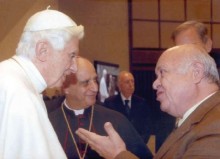Have we lost Jesus?
 Is it a coincidence that the Synod of Bishops on “New Evangelisation and the Transmission of Faith” is held in the year 2012, precisely 2,000 years since that striking event recorded in the Gospel of Luke, when Jesus was lost and found in the temple? And is it also a coincidence that the Year of Faith has started also as we draw to the commemoration of this event during Christmastide?
Is it a coincidence that the Synod of Bishops on “New Evangelisation and the Transmission of Faith” is held in the year 2012, precisely 2,000 years since that striking event recorded in the Gospel of Luke, when Jesus was lost and found in the temple? And is it also a coincidence that the Year of Faith has started also as we draw to the commemoration of this event during Christmastide?
This question did not cross my mind – maybe it should have had – until I read the Relatio of one of the few laity present at the Synod of Bishops, Prof. José PRADO FLORES, Founder and International Director of the Sant’Andrea Schools of Evangelization. His reflection is worth pondering upon.
He said: “If Joseph and Mary lost Jesus in Jerusalem, something similar may happen today in the wanderings of our Church. Five centuries ago we left the joyful First Proclamation and took refuge in the sacraments, dogmas and catechisms; which are not bad, so long as they come after the First Proclamation. Not before, and above all, not in its place. Some lost the Word, and preferred the full plans of human knowledge. I would not allow myself to state that we have lost Jesus, but I wonder…”
One can understand his respect and prudence. But this did not keep him back from posing courageously some challenging questions. So, he continued: “Do we really consider everything as loss and rubbish, upon “knowing Christ Jesus my Lord”? (Ph 3: 7-8). Do we experience the joy of he who has found hidden treasure? (Mt 13:44). Why in many acts of devotion is it so difficult to find the Risen Christ, alive? If the Risen Christ does not appear to all people “but only to the witnesses” who go to proclaim the Gospel (Hech 10, 40:42), can we say that we have had a personal encounter with living Jesus, who identifies us as witnesses?”
One cannot but agree with his conclusion: “The people of God repeat and demand to us: “We want to see Jesus’. Paul failed at Areopagus because he spoke of the resurrection but not of the Risen Christ, while Peter obtained a rich haul in Jerusalem because he ‘pierced the heart’ with the sword of the Spirit. The problem is not that the Catholic Church does not evangelize, but rather that at times it is the ‘non-evangelized’ who evangelize. This is to say that some evangelizers have not yet risen to Jordan to have personal experience of the love of God, and have not yet entered into the Last Supper to experience their personal Pentecost…. Just as Joseph and Mary returned to find Jesus in the place where they had left him (Lk 2:45), so we too return to Jerusalem, where we find an empty tomb!”
I do not know what impact these words had on the Bishops and all the other participants at the Synod. But reading many of the other personal reflections, together with the opening speech of the Holy Father, it seems that the Holy Spirit is blowing in one direction. New evangelization needs new evangelizers; we succeed in evangelizing anew the de-Christianized Countries of long Christian tradition in as much as we let ourselves be evangelized by the Gospel of Jesus Christ.
This is confirmed by the successor of Cardinal Marc Ouellet (now Prefect of the Pontifical Congregation for the Bishops), Archbishop of Quebec Mons. Gérald Cyprien Lacroix. He said “We are the ones that need to change first, it is we who need to let ourselves be converted”. To explain Himself, He gave this personal testimony: “At the beginning, when the Pope announced this Year of Faith, I could not see the connection, I said to myself: ‘But why? We already have a difficulty in having a New Evangelization! Why should one add a Year of Faith?’ But now I understand very well how much it is indispensable.”
If we need to introduce people to Jesus, we need to have met Him in a personal way, we need to know Him. If we too have lost Him, we need to seek Him until we ourselves have found Him!
Fr Paul Fenech
